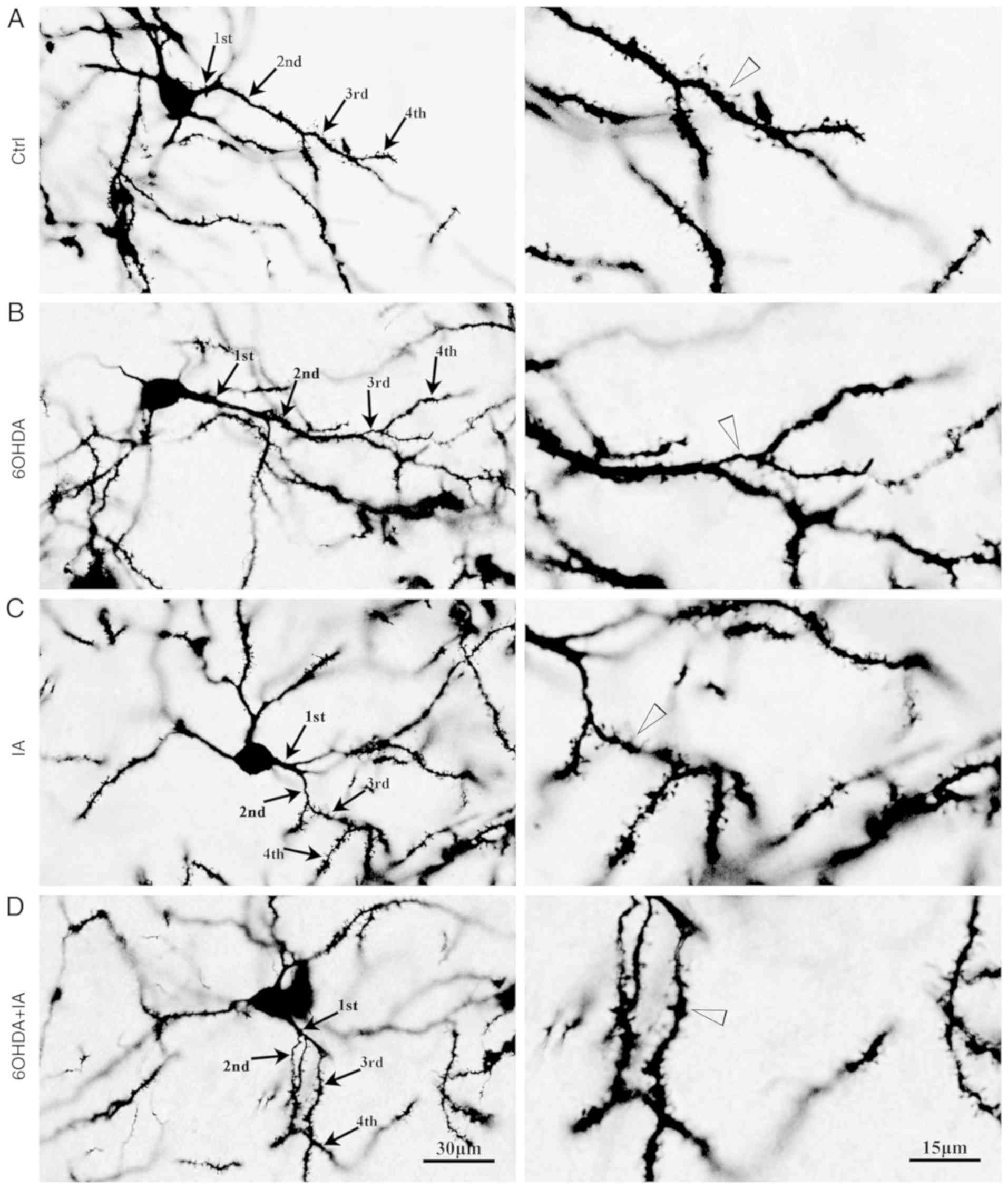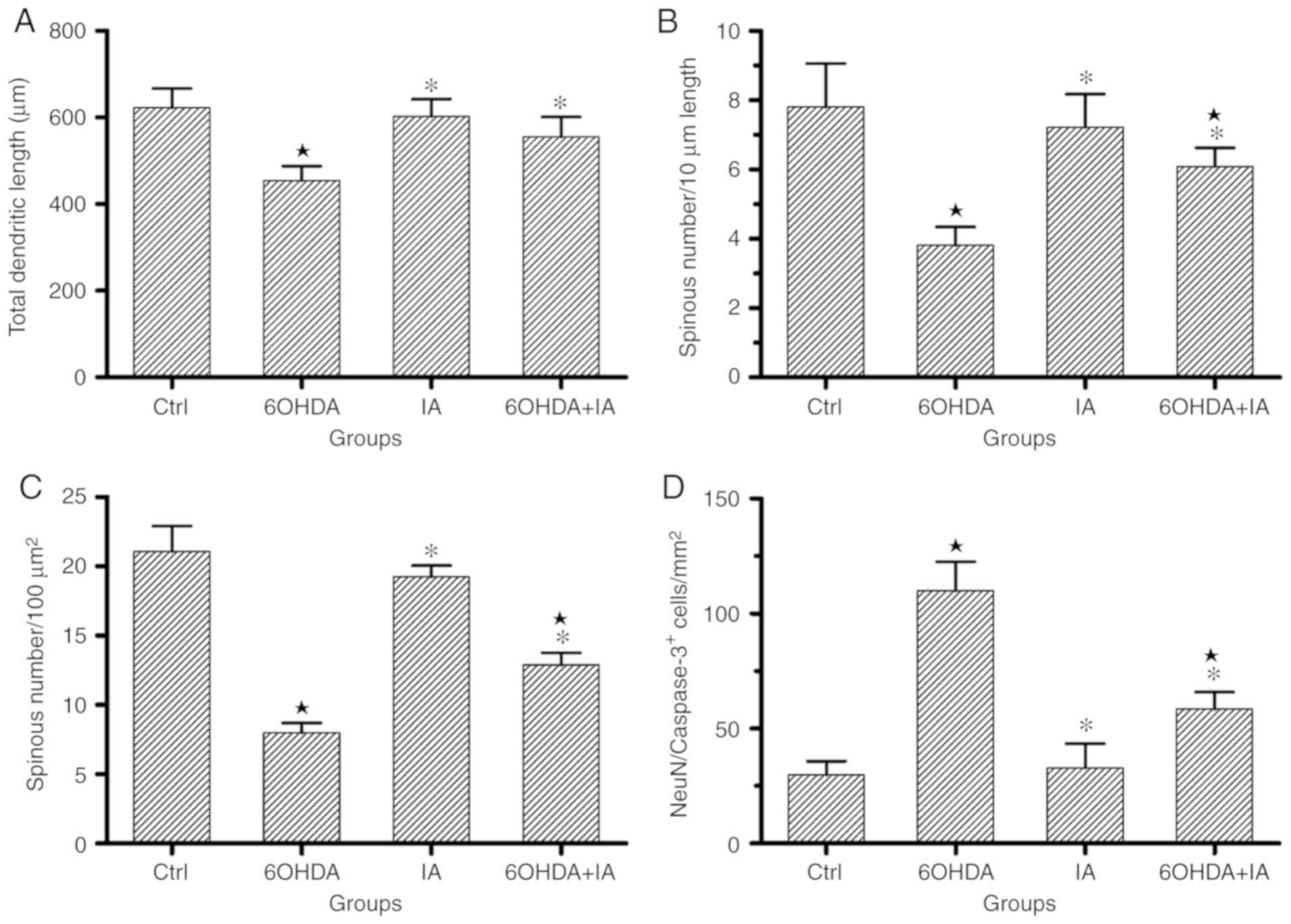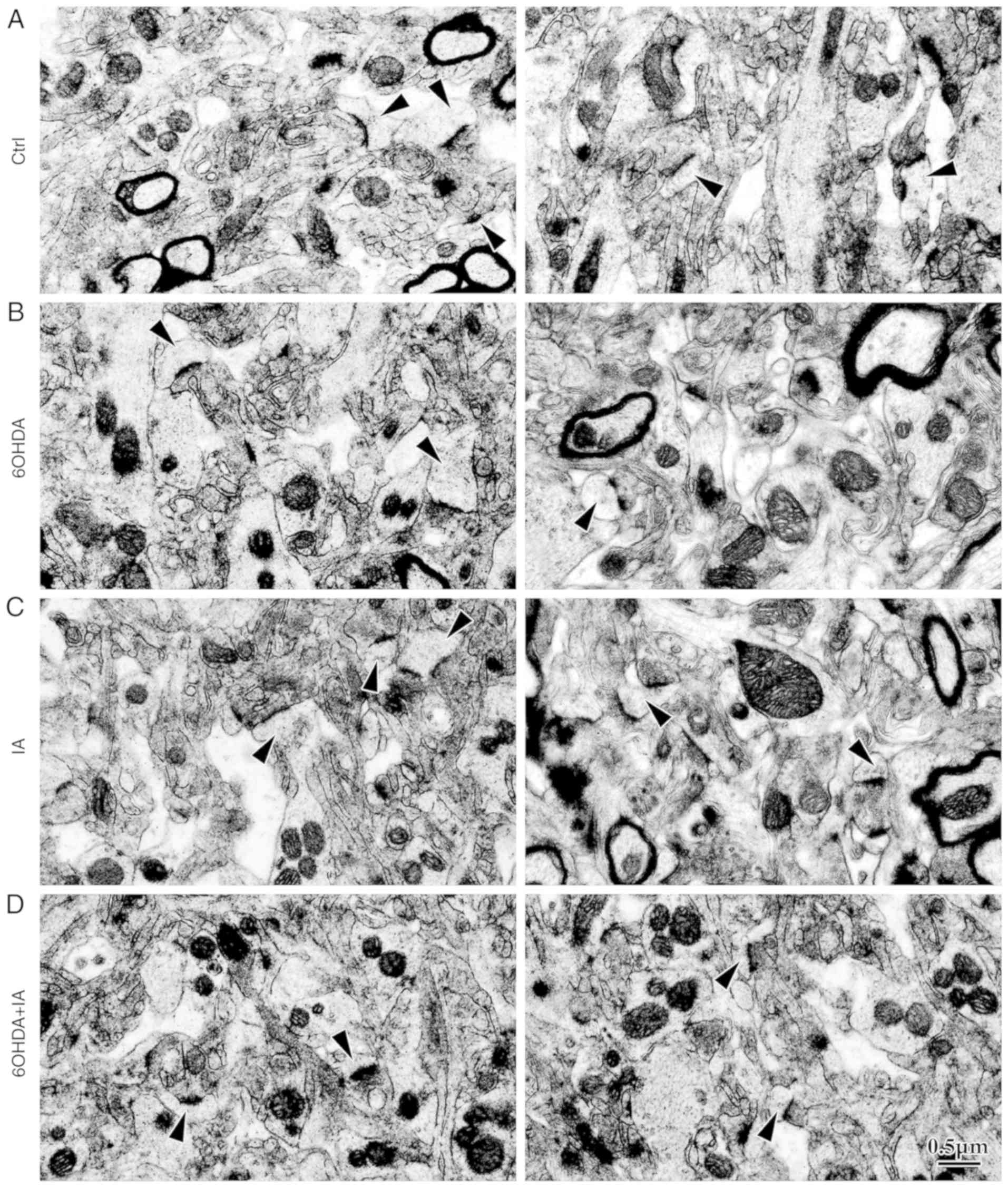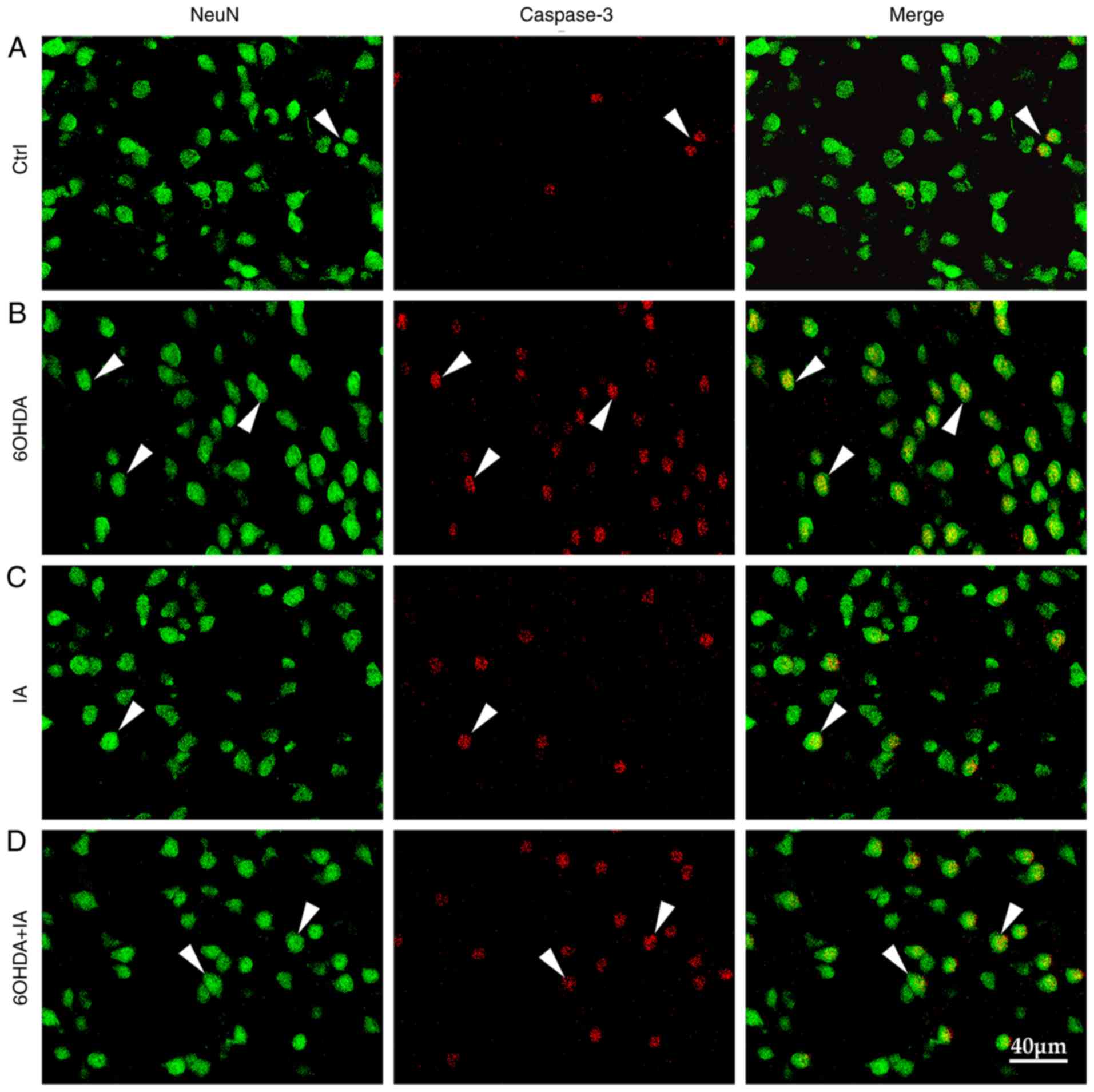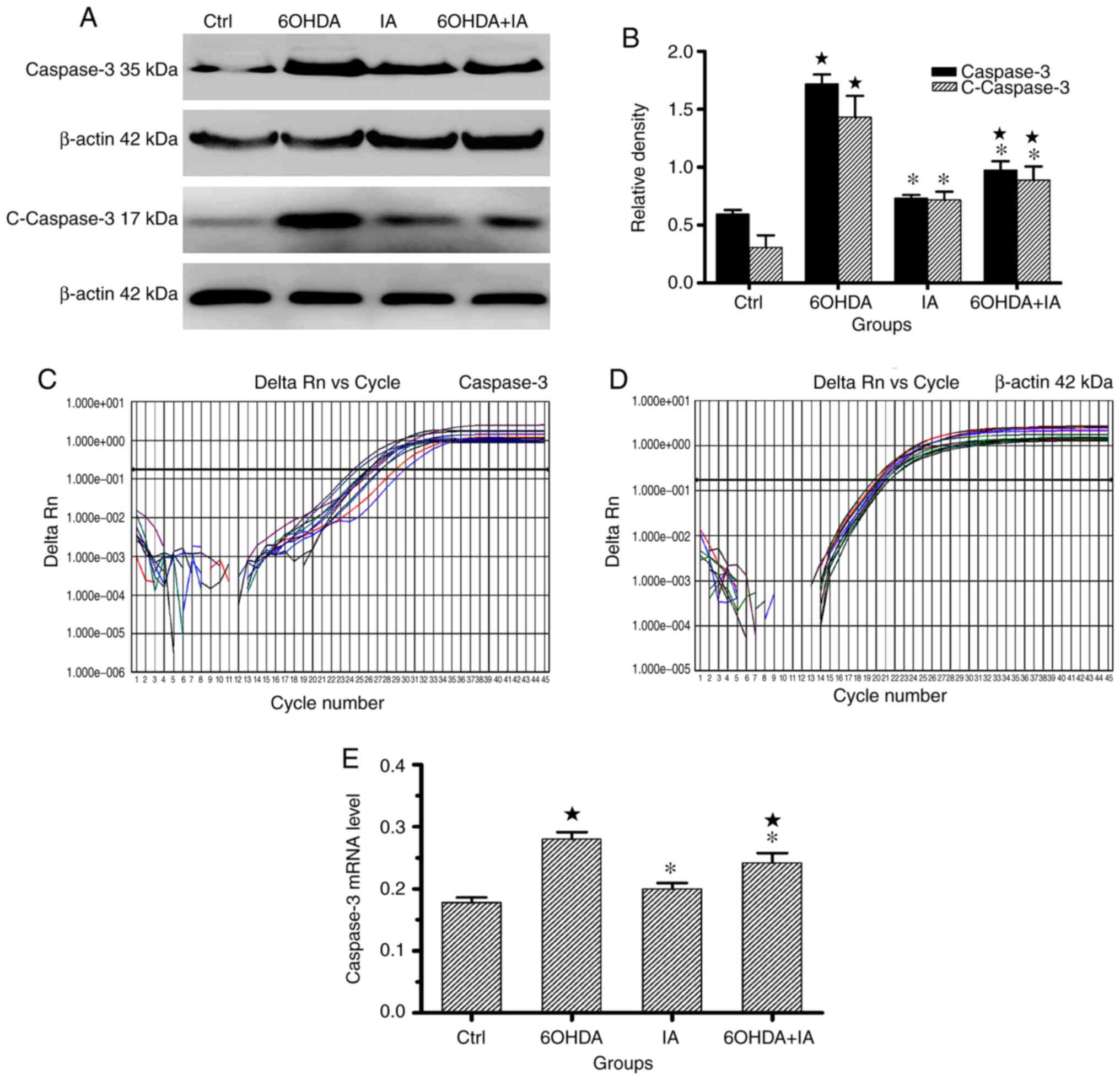|
1
|
Hornykiewicz O: Dopamine
(3-hydroxytyramine) and brain function. Pharmacol Rev. 18:925–964.
1966.PubMed/NCBI
|
|
2
|
Gibb WR and Lees AJ: Anatomy,
pigmentation, ventral and dorsal subpopulations of the substantia
nigra, and differential cell death in parkinson's disease. J Neurol
Neurosurg Psychiatry. 54:388–396. 1991. View Article : Google Scholar : PubMed/NCBI
|
|
3
|
Villalba RM and Smith Y: Differential
striatal spine pathology in Parkinson's disease and cocaine
addiction: A key role of dopamine. Neuroscience. 251:2–20. 2013.
View Article : Google Scholar : PubMed/NCBI
|
|
4
|
Penney JB and Young AB: Speculations on
the functional anatomy of basal ganglia disorders. Annu Rev
Neurosci. 6:73–94. 1983. View Article : Google Scholar : PubMed/NCBI
|
|
5
|
DeLong MR: Primate models of movement
disorders of basal ganglia origin. Trends Neurosci. 13:281–285.
1990. View Article : Google Scholar : PubMed/NCBI
|
|
6
|
Albin RL, Young AB and Penney JB: The
functional anatomy of disorders of the basal ganglia. Trends
Neurosci. 18:63–64. 1995. View Article : Google Scholar : PubMed/NCBI
|
|
7
|
DeLong MR and Wichmann T: Basal ganglia
circuits as targets for neuromodulation in parkinson disease. JAMA
Neurol. 72:1354–1360. 2015. View Article : Google Scholar : PubMed/NCBI
|
|
8
|
Kreitzer AC and Malenka RC: Striatal
plasticity and basal ganglia circuit function. Neuron. 60:543–54.
2008. View Article : Google Scholar : PubMed/NCBI
|
|
9
|
Kreitzer AC: Physiology and pharmacology
of striatal neurons. Annu Rev Neurosci. 32:127–147. 2009.
View Article : Google Scholar : PubMed/NCBI
|
|
10
|
Parker JG, Marshall JD, Ahanonu B, Wu YW,
Kim TH, Grewe BF, Zhang Y, Li JZ, Ding JB, Ehlers MD and Schnitzer
MJ: Diametric neural ensemble dynamics in parkinsonian and
dyskinetic states. Nature. 557:177–182. 2018. View Article : Google Scholar : PubMed/NCBI
|
|
11
|
Jimenez-Shahed J: A review of current and
novel levodopa formulations for the treatment of parkinson's
disease. Ther Deliv. 7:179–191. 2016. View Article : Google Scholar : PubMed/NCBI
|
|
12
|
Xiao D: Acupuncture for parkinson's
disease: A review of clinical, animal, and functional magnetic
resonance imaging studies. J Tradit Chin Med. 35:709–717. 2015.
View Article : Google Scholar
|
|
13
|
Ma Y, Zhan M, OuYang L, Li Y, Chen S, Wu
J, Chen J, Luo C and Lei W: The effects of unilateral 6-OHDA lesion
in medial forebrain bundle on the motor, cognitive dysfunctions and
vulnerability of different striatal interneuron types in rats.
Behav Brain Res. 1:37–45. 2014. View Article : Google Scholar
|
|
14
|
Jia Y, Mo SJ, Feng QQ, Zhan ML, OuYang LS,
Chen JC, Ma YX, Wu JJ and Lei WL: EPO-dependent activation of
PI3K/Akt/FoxO3a signalling mediates neuroprotection in in vitro and
in vivo models of parkinson's disease. J Mol Neurosci. 53:117–124.
2014. View Article : Google Scholar : PubMed/NCBI
|
|
15
|
Ma Y, Feng Q, Ouyang L, Mu S, Liu B, Li Y,
Chen S and Lei W: Morphological diversity of GABAergic and
cholinergic inter-neurons in the striatal dorsolateral and
ventromedial regions of rats. Cell Mol Neurobiol. 34:351–359. 2014.
View Article : Google Scholar
|
|
16
|
Garcia BG, Neely MD and Deutch AY:
Cortical regulation of striatal medium spiny neuron dendritic
remodeling in parkinsonism: Modulation of glutamate release
reverses dopamine depletion-induced dendritic spine loss. Cereb
Cortex. 20:2423–2432. 2010. View Article : Google Scholar : PubMed/NCBI
|
|
17
|
Mitchell IJ, Lawson S, Moser B, Laidlaw
SM, Cooper AJ, Walkinshaw G and Waters CM: Glutamate-induced
apoptosis results in a loss of striatal neurons in the parkinsonian
rat. Neuroscience. 63:1–5. 1994. View Article : Google Scholar : PubMed/NCBI
|
|
18
|
Hernandez-Baltazar D, Mendoza-Garrido ME
and Martinez- Fong D: Activation of GSK-3β and caspase-3 occurs in
nigral dopamine neurons during the development of apoptosis
activated by a striatal injection of 6-hydroxydopamine. PLoS One.
8:e709512013. View Article : Google Scholar
|
|
19
|
Shah M, Rajagopalan S, Xu L, Voshavar C,
Shurubor Y, Beal F, Andersen JK and Dutta AK: The high-affinity
D2/D3 agonist D512 protects PC12 cells from 6-OHDA-induced
apoptotic cell death and rescues dopaminergic neurons in the MPTP
mouse model of parkinson's disease. J Neurochem. 131:74–85. 2014.
View Article : Google Scholar : PubMed/NCBI
|
|
20
|
General administration of quality
supervision, inspection and quarantine of the Republic People's of
China: Laboratory animal - Guideline for Ethical Review of Animal
Welfare (GB/T 35892-2018). General Administration of Press and
Publication of the People's Republic of China; Beijing: 2018,
http://openstd.samr.gov.cn/bzgk/gb/newGbInfo?hcno=9BA619057D5C13103622A10FF4BA5D14.
|
|
21
|
Deumens R, Blokland A and Prickaerts J:
Modeling parkinson's disease in rats: An evaluation of 6-OHDA
lesions of the nigrostriatal pathway. Exp Neurol. 175:303–317.
2002. View Article : Google Scholar : PubMed/NCBI
|
|
22
|
Zheng X, Wu J, Zhu Y, Chen S, Chen Z, Chen
T, Huang Z, Wei J, Li Y and Lei W: A Comparative study for
striatal-direct and-indirect pathway neurons to DA
depletion-induced lesion in a PD rat model. Neurochem Int.
118:14–22. 2018. View Article : Google Scholar : PubMed/NCBI
|
|
23
|
Chen Wu JJ, Ouyang S, Jia LS, Liu Y, Mu
BB, Ma SH, Wang YX, Wei WP, Li JYYL, et al: Cortical regulation of
striatal projection neurons and interneurons in a parkinson's
disease rat model. Neural Regen Res. 11:1969–1975. 2016. View Article : Google Scholar
|
|
24
|
Shear DA, Dong J, Gundy CD, Haik-Creguer
KL and Dunbar GL: Comparison of intrastriatal injections of
quinolinic acid and 3-nitropropionic acid for use in animal models
of Huntington's disease. Prog Neuropsychopharmacol Biol Psychiatry.
22:1217–1240. 1998. View Article : Google Scholar : PubMed/NCBI
|
|
25
|
Vorhees CV and Williams MT: Morris water
maze: Procedures for assessing spatial and related forms of
learning and memory. Nat Protoc. 1:848–858. 2006. View Article : Google Scholar
|
|
26
|
Mu S, Lin E, Liu B, Ma Y, OuYang L, Li Y,
Chen S, Zhang J and Lei W: Melatonin reduces projection neuronal
injury induced by 3-nitropropionic acid in the rat striatum.
Neurodegener Dis. 14:139–150. 2014. View Article : Google Scholar : PubMed/NCBI
|
|
27
|
Garcia-Segura LM and Perez-Marquez J: A
new mathematical function to evaluate neuronal morphology using the
Sholl analysis. J Neurosci Methods. 226:103–109. 2014. View Article : Google Scholar : PubMed/NCBI
|
|
28
|
Graveland GA, Williams RS and DiFiglia M:
A golgi study of the human neostriatum: Neurons and afferent
fibers. J Comp Neurol. 234:317–333. 1985. View Article : Google Scholar : PubMed/NCBI
|
|
29
|
Deng YP, Wong T, Bricker-Anthony C, Deng B
and Reiner A: Loss of corticostriatal and thalamostriatal synaptic
terminals precedes striatal projection neuron pathology in
heterozygous Q140 Huntington's disease mice. Neurobiol Dis.
60:89–107. 2013. View Article : Google Scholar : PubMed/NCBI
|
|
30
|
Livak KJ and Schmittgen TD: Analysis of
relative gene expression data using real-time quantitative PCR and
the 2(-Delta Delta C(T)) method. Methods. 25:402–408. 2001.
View Article : Google Scholar
|
|
31
|
Wearne SL, Rodriguez A, Ehlenberger DB,
Rocher AB, Henderson SC and Hof PR: New techniques for imaging,
digiti-zation and analysis of three-dimensional neural morphology
on multiple scales. Neuroscience. 136:661–680. 2005. View Article : Google Scholar
|
|
32
|
Lammel S, Lim BK and Malenka RC: Reward
and aversion in a heterogeneous midbrain dopamine system.
Neuropharmacology. 76(Pt B): 351–359. 2014. View Article : Google Scholar
|
|
33
|
Kawaguchi Y, Wilson CJ, Augood SJ and
Emson PC: Striatal interneurones: Chemical, physiological and
morphological characterization. Trends Neurosci. 18:527–535. 1995.
View Article : Google Scholar : PubMed/NCBI
|
|
34
|
Gerfen CR and Surmeier DJ: Modulation of
striatal projection systems by dopamine. Annu Rev Neurosci.
34:441–466. 2011. View Article : Google Scholar : PubMed/NCBI
|
|
35
|
Mowery TM, Penikis KB, Young SK, Ferrer
CE, Kotak VC and Sanes DH: The sensory striatum is permanently
impaired by transient developmental deprivation. Cell Rep.
19:2462–2468. 2017. View Article : Google Scholar : PubMed/NCBI
|
|
36
|
Zhai S, Tanimura A, Graves SM, Shen W and
Surmeier DJ: Striatal synapses, circuits, and Parkinson's disease.
Curr Opin Neurobiol. 48:9–16. 2018. View Article : Google Scholar
|
|
37
|
Radl D, Chiacchiaretta M, Lewis RG,
Brami-Cherrier K, Arcuri L and Borrelli E: Differential regulation
of striatal motor behavior and related cellular responses by
dopamine D2L and D2S isoforms. Proc Natl Acad Sci USA. 115:198–203.
2018. View Article : Google Scholar
|
|
38
|
Gerfen CR: Indirect-pathway neurons lose
their spines in parkinson disease. Nat Neurosci. 9:157–158. 2006.
View Article : Google Scholar : PubMed/NCBI
|
|
39
|
Parker PR, Lalive AL and Kreitzer AC:
Pathway-specific remodeling of thalamostriatal synapses in
parkinsonian mice. Neuron. 89:734–740. 2016. View Article : Google Scholar : PubMed/NCBI
|
|
40
|
Yoshioka H, Niizuma K, Katsu M, Sakata H,
Okami N and Chan PH: Consistent injury to medium spiny neurons and
white matter in the mouse striatum after prolonged transient global
cerebral ischemia. J Neurotrauma. 28:649–660. 2011. View Article : Google Scholar : PubMed/NCBI
|
|
41
|
de Oliveira PA, Ben J, Matheus FC,
Schwarzbold ML, Moreira ELG, Rial D, Walz R and Prediger RD:
Moderate traumatic brain injury increases the vulnerability to
neurotoxicity induced by systemic administration of
6-hydroxydopamine in mice. Brain Res. 1663:78–86. 2017. View Article : Google Scholar : PubMed/NCBI
|
|
42
|
Beal MF, Ferrante RJ, Swartz KJ and Kowall
NW: Chronic quinolinic acid lesions in rats closely resemble
huntington's disease. J Neurosci. 11:1649–1659. 1991. View Article : Google Scholar : PubMed/NCBI
|
|
43
|
Graham RK, Pouladi MA, Joshi P, Lu G, Deng
Y, Wu NP, Figueroa BE, Metzler M, André VM, Slow EJ, et al:
Differential susceptibility to excitotoxic stress in YAC128 mouse
models of huntington disease between initiation and progression of
disease. J Neurosci. 29:2193–2204. 2009. View Article : Google Scholar : PubMed/NCBI
|
|
44
|
Chakraborty J, Nthenge-Ngumbau DN, Rajamma
U and Mohanakumar KP: Melatonin protects against behavioural
dysfunctions and dendritic spine damage in 3-nitropropionic
acid-induced rat model of huntington's disease. Behav Brain Res.
264:91–104. 2014. View Article : Google Scholar : PubMed/NCBI
|
|
45
|
Sardi S, Vardi R, Sheinin A, Goldental A
and Kanter I: New types of experiments reveal that a neuron
functions as multiple independent threshold units. Sci Rep.
7:180362017. View Article : Google Scholar : PubMed/NCBI
|
|
46
|
Shen W, Tian X, Day M, Ulrich S, Tkatch T,
Nathanson NM and Surmeier DJ: Cholinergic modulation of Kir2
channels selectively elevates dendritic excitability in
striatopallidal neurons. Nat Neurosci. 10:1458–1466. 2007.
View Article : Google Scholar : PubMed/NCBI
|
|
47
|
Romashkova JA and Makarov SS: NF-kappaB is
a target of AKT in anti-apoptotic PDGF signalling. Nature.
401:86–90. 1999. View
Article : Google Scholar : PubMed/NCBI
|
|
48
|
Ruiz-Calvo A, Maroto IB, Bajo-Grañeras R,
Chiarlone A, Gaudioso Á, Ferrero JJ, Resel E, Sánchez-Prieto J,
Rodríguez-Navarro JA, Marsicano G, et al: Pathway-specific control
of striatal neuron vulnerability by corticostriatal cannabinoid CB1
receptors. Cereb Cortex. 28:307–322. 2018. View Article : Google Scholar
|
|
49
|
Singh S and Kumar P: Neuroprotective
potential of curcumin in combination with piperine against
6-hydroxy dopamine induced motor deficit and neurochemical
alterations in rats. Inflammopharmacology. 25:69–79. 2017.
View Article : Google Scholar
|
|
50
|
Leung TC, Lui CN, Chen LW, Yung WH, Chan
YS and Yung KK: Ceftriaxone ameliorates motor deficits and protects
dopaminergic neurons in 6-hydroxydopamine-lesioned rats. ACS Chem
Neurosci. 3:22–30. 2012. View Article : Google Scholar : PubMed/NCBI
|
|
51
|
Packard MG and Knowlton BJ: Learning and
memory functions of the basal ganglia. Annu Rev Neurosci.
25:563–593. 2002. View Article : Google Scholar : PubMed/NCBI
|















